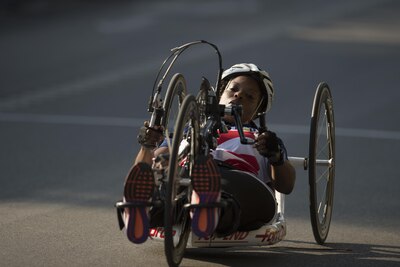TORONTO, Sept. 28, 2017 — As Sharona Young, a medically
retired Navy chief petty officer, crossed the finish line here at the 2017
Invictus Games at High Park Sept. 26, she was in shock that she had earned her
first medal in an athletic competition.
“The volunteers were like, ‘We’re walking back to the
podium.’ I thought we were just going to go support everybody who won. I was
like, ‘Okay, let’s go cheer them on,’ but they were like, ‘No, you’re going to
the podium,’” she said in disbelief.
“I was pretty shocked,” Young said. “My goal was just to get
out here, do my best and finish -- just finish strong and not get stuck
anywhere. I’m pretty surprised I actually medaled.”
Young earned the bronze medal in the women’s hand cycle time
trial for her disability category. She last competed in cycling and swimming
during the 2013 Department of Defense Warrior Games in Colorado Springs,
Colorado, but didn’t medal.
Young said she had fun despite finishing out of medal range
at the Warrior Games. This year, at her first Invictus Games, she is competing
in wheelchair tennis and cycling.
Young said the course here is beautiful, but challenging.
“It was harder than I’m used to,” she said. “I live in Orlando and there’re not
many hills. It’s just a straight road and flat surface. There were lots of
hills and turns.”
Injury
Young served in the Navy for 14 years as a yeoman. Her
father was a Marine and her uncle served in the Army in Vietnam. She said she
joined the Navy to travel the world. After 9/11, she said, her ship was one of
the first to deploy off the coast of Iraq, having passed through the Suez Canal
and into the Persian Gulf.
In 2013, Young was diagnosed with multiple sclerosis, a
disabling disease of the central nervous system that disrupts the flow of
information within the brain and between the brain and the body. While she was
transitioning out of the military, she found out about adaptive sports through
Navy Safe Harbor.
Support
“My counselor there encouraged me to go and check out the
trials in Virginia. I’m like, ‘I don’t do any sports. That’s not me.’ She pushed
me to go and try it out. I’m really glad she did because I love it,” she said.
Young said the support she has received at the Invictus
Games has been tremendous. “I’m blown away by how supportive everyone has been
and all of the encouragement I receive from all of the other athletes,” she
said. “From the staff, from the volunteers, it’s been awesome and a huge help.”
For tennis, the city of Toronto provided a tennis court over
a fountain at Nathan Phillips Square so the athletes would have a nice
location, she said. “It was beautiful,” Young said. “It was such a nice
platform that they put down for us to have matches on. I was like, ‘This is
gorgeous.’ I really enjoyed tennis. I got a bunch of new tips and things to
work on, what I should and shouldn’t do. It was fun.”
Young said she enjoyed having the Canadian community come
out and cheer for her, giving support and thanking Team U.S. for coming to
Toronto.
Adaptive Sports
Young encourages service members with disabilities to give
adaptive sports a try. “Don’t be afraid of the challenges or the unknown. Just
trust yourself and have fun. Focus on what you can do, what skills you have and
go from there,” she said. “Come out of your comfort zone and try something new
because you might end up finding something you absolutely love that you
otherwise wouldn’t have had a chance to experience. Try something new.”
Young said families and caregivers are essential to the
athletes at Invictus.
“It’s one of the most important things because you need that
rock; you need that person you can depend on when you’re in that dark place to
push you or give you that little extra to get going,” she said. “Even if you
don’t realize you need it, your family and support systems can see when you’re
struggling before you can and be there to give you that boost.”
Young’s support system is her caregiver and sister, Nakesha,
and daughter, Taylor, 11. “They mean the world to me; they are my everything,”
she said. “I wouldn’t be here without them, without their help and
encouragement and just the support I get on a day-to-day basis from them.”
More than 550 wounded, ill and injured service members from
17 nations compete in 12 sporting events including archery, track and field,
cycling, golf, sitting volleyball, swimming, wheelchair rugby and wheelchair
basketball from Sept. 23 to 30 as they are cheered on by thousands of family
members, friends and spectators in the Distillery District here.

No comments:
Post a Comment